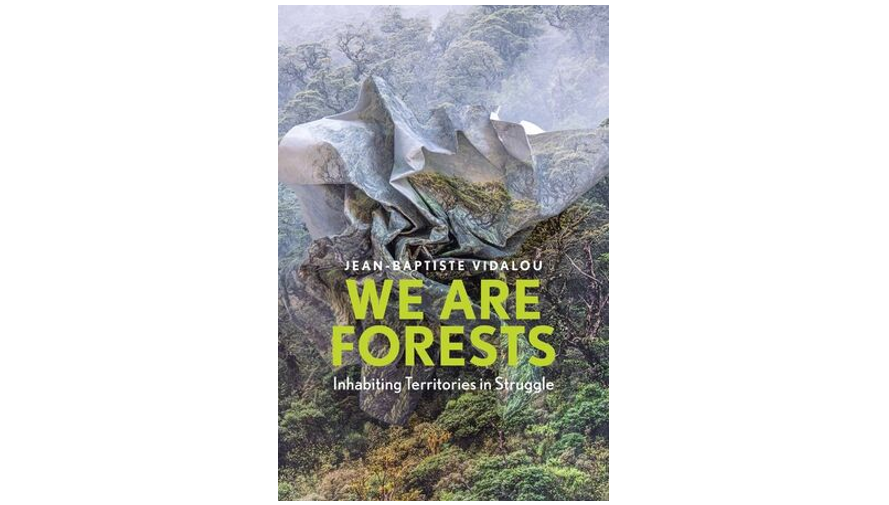Inhabiting Territories In Struggle
Jean-Baptiste Vidalou translated by Stephen Muecke
Polity, 2023, 208 pages
Paperback: £15.99 | ISBN 9781509556526
Review by Barry Larking
I ought to point out at once this work of philosophic enquiry is not actually about forests from an ecological perspective. But it is a rewarding (if demanding) enquiry into how in our modern western world we have had a serious relationship with forests, despite de-forestation and an increasingly deterministic attitude to the entirety of nature.
M. Vidalou sets out his thinking about what ‘the forest’ means explicitly:
“Everything that is still heterogenous, everything that lives on profusely but in shadows, is always too chaotic in the eyes of the ‘planetary stewards’, and is compelled to integrate into this generalised equivalence, made legible and manageable”.
To be manageable is to be controlled (by whom? For what purpose?) –
“Though Global Forest Watch, Google boasts that it is the first to offer professionals and the general public very high-resolution of the state of the forest … The fact that these spaces, these forests, only have meaning once they are measured, measured by the yardstick of their very destruction, is itself a disaster.”
To the author this ‘hegemonic control’ is the issue at hand; we watch our destruction of the forests, our world ‘from above, from our satellites’.
“It seems that you can judge an era by the way it treats its forests. This one will be judged by the way it measures, pixel by pixel, its own annihilation.” (p2)
That the forest is a thing independent of our proscriptive plans and ‘management’ schemes arising from modern human’s desire to dominate through politics, commerce, science, and, finally, objections to this advance, are the subject of this work.
As an illustration, Chapter 10 cites Marx’s Debates on the Law of Wood Theft (1842) in terms of commodity:
“… according to Marx the wood [formerly collected by peasants] that was included in customary rights was transformed into property rights … violently excluding the multiplicities of ‘human needs.” (p86)
Even twigs thus can now belong to someone, not no one as before, and the matter of the several relationships to ‘the forest’ are reduced to another form of capitalist ownership through seizure, thereby breaking a psychic bond beyond mere utility that ‘the forest’ played. This, to M. Vidalou, stems from the first actions in early modern times of map making, of grasping, limiting and assessing ‘the forest’ and thereby removing it from one sphere of human experience into another, dominant power, political, transactional.
M.Vidalou is a philosopher (and “dry stone wall builder”). He quotes Martin Heidegger* who, in a 1953 lecture, “warned against the universal reduction of nature understood as a fund … put at the sole will of the technological power of man …Objects are no longer in front of us deserving of a relationship … but are pure resources that can be replaced or reinvested.” (p90) Resources our science routinely quantifies, weighs and monetises.
If you, like me, doubt the only way we can see nature is through the data we so obsessively collect and pore over – trying to detect all that which we cannot see – and wonder if ours is just a newer form of an older, discredited interventionism; or, if, in fact you have pondered about why we still stumble for some kind of ‘complete picture’ of nature, then this book is for you.
Nothing quite separates the French from the rest as their capacity for (and delight in) obstruse abstract thought. But it would be glib to dismiss the contribution of such exact philosophic interrogation of our present understanding of our accepted view of things. We are more creatures of ideas than we like to think, as it were. As Raymond Williams pointed out decades ago, ‘nature’ is the most complex word in the English language.**
The Anglo Saxon tradition springs from a very different soil – Empiricism. But this approach has its disadvantages. Few sincerely argue that materialism isn’t real and useful, but that that cannot be an end in itself has long been recognised. M. Vidalou sharply believes that the rationalist, materialist, approach to our human relationship with nature has come at great cost at all levels. Those costs are mirrored straight back at us when we examine the notion of ‘the forest’ as a political, social, and spiritual metaphor for our times.
* I found no mention of philosopher Pierre-Joseph Proudhon (1809-65) in the references or text. Proudhon, ‘the first anarchist’, held similar views about the nature of relationships in our modern world in his The General Idea of the Revolution (1851) “To be GOVERNED is to be watched, inspected, spied upon, directed, law-driven, numbered, regulated, enrolled, indoctrinated, preached at, controlled, checked, estimated, valued, censured, commanded, by creatures who have neither the right nor the wisdom nor the virtue to do so.”
** Keywords: A Vocabulary of Culture and Society Raymond Williams 1976



The relationship between natural governance* and property rights is a key issue for conservation and restoration. Interesting, therefore, that the rewilding movement, in Britain anyway, often focuses on the importance of land ownership * https://www.oxfordmartin.ox.ac.uk/natural-governance.